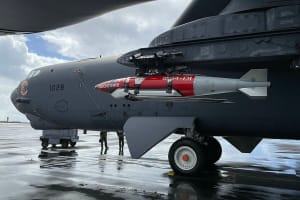Monitoring committee for Lebanon ceasefire meets for first time as IDF continues striking Hezbollah violations
Failed communication leads to an accident resulting in the death of 4 IDF soldiers

The committee tasked with monitoring the ceasefire between Israel and Hezbollah in Lebanon held its first meeting on Monday, while the Israeli military continued to dismantle terrorist infrastructure and target Hezbollah operatives violating the agreement.
“The United States, France, UNIFIL, LAF, and the IDF met on December 9 in Naqoura to coordinate their support for the cessation of hostilities that went into effect on November 27,” the U.S. embassy in Beirut announced.
The agreement stipulated that the committee would oversee the enforcement of its terms by all parties, including granting the IDF a 60-day period to withdraw from southern Lebanon. During the same time, Hezbollah is to withdraw from south of the Litani River, while the Lebanese army (LAF) is expected to deploy in its stead and take control of the area, and the border with Israel.
“As set out in the announcement, UNIFIL hosted the meeting, with the United States serving as chair, assisted by France, and joined by the LAF and IDF. This mechanism will meet regularly and coordinate closely to advance implementation of the ceasefire agreement and UNSCR 1701,” the embassy added.
Today, Ambassador Johnson introduced Major General Jasper Jeffers to PM Mikati. General Jeffers will advance the ceasefire agreement by assessing implementation and providing military-technical advice. @grandserail pic.twitter.com/byoJZpDIPl
— U.S. Embassy Beirut (@usembassybeirut) December 2, 2024
The United States reported that Maj.-Gen. Jasper Jeffers and White House envoy, Amos Hochstein, would co-chair the committee until a permanent civilian was appointed.
France appointed Brig.-Gen. Guillaume Ponchin and 10 military and civilian personnel to assist him. “The mechanism will cooperate with the Military Technical Committee for Support to Lebanon with the aim of strengthening the Lebanese Army and assisting its deployment in the south of the country.”
Lebanon's caretaker prime minister, Najib Mikati, met with Ponchin last Thursday. After the meeting, Mikati said that “the priorities of the Lebanese stance are the ceasefire, the Israeli violations, the withdrawal of the Israeli army from Lebanese territory, and reinforcing the deployment of the Lebanese Army in the South.”
Other aspects of the agreement, such as the withdrawal and eventual disarmament of Hezbollah, went unmentioned.
Last week, France and the U.S. endorsed Lebanese complaints that Israel had violated the terms of the agreement over 50 times, while the IDF has been striking Hezbollah operatives almost daily since the ceasefire began.
According to Lebanese authorities which don’t distinguish between civilians and terrorists, 22 people have been killed in Israeli strikes since the ceasefire took effect.
The IDF said on Sunday that an aircraft struck Hezbollah terrorists who were operating in a weapons warehouse in southern Lebanon, as well as a group of terrorists who “posed a threat” in another incident.
On Monday, Hezbollah-affiliated Al-Mayadeen News reported that an Israeli drone strike targeting a vehicle near an army checkpoint in Bint Jbeil killed a Hezbollah operative and wounded several soldiers.
Other reports claimed Israeli troops detonated several buildings in al-Khiam overnight. The Israeli army has also continued to release updates about its activity in southern Lebanon, where it continues to locate and destroy Hezbollah infrastructure.
Troops of the 7th Brigade found weapons stores containing hundreds of anti-tank rockets, grenade mortars and a rocket launcher vehicle hidden in a civilian area on Monday.
“Also, the forces located and destroyed a number of shafts that led to additional underground infrastructures of Hezbollah,” the army stated.
During one of the search operations, four IDF reservists were killed in an operational accident. Preliminary findings suggest they entered a tunnel used by Hezbollah to store weapons, triggering a booby trap that also caused an explosion of the stored weapons.
The IDF reported that the booby trap “with high probability” had been left there when Israeli troops first captured the area months ago. The explosion caused a cave-in, trapping several soldiers in the tunnel and killing four of them.

The All Israel News Staff is a team of journalists in Israel.














